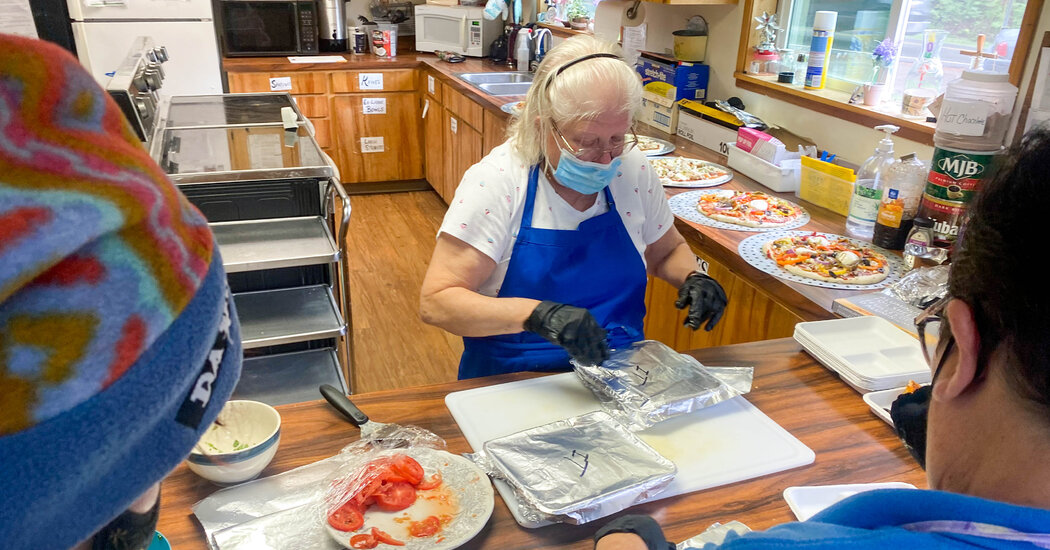St. Timothy’s Episcopal Church in Brookings, Ore., is challenging a new municipal ordinance that limits church soup kitchen programs to two days a week.
With each new valley confronting poor Americans during the coronavirus pandemic, the soup kitchen lines outside St. Timothy’s Episcopal Church in Brookings, Ore., have remained steady, the comfort of a hot meal drawing the area’s most marginalized to the parish up to four times a week.
At one point, the church served meals six days a week, shouldering some of the load as other parishes scaled back their programs. Its most popular offering: pizza on Friday nights.
But as of Jan. 26, a program that in the church’s view was a universally identifiable act of Christian charity suddenly broke the law. Under a city ordinance that was approved unanimously in the fall, churches in residential zones, including St. Timothy’s, can serve meals to the needy only two days a week. They are also required to obtain a permit.
Two days after the ordinance took effect, St. Timothy’s filed a federal lawsuit against the city of Brookings, a community of between 6,000 and 7,000 people nestled along Oregon’s southwestern Pacific coastline.
The church said that the restrictions, prompted by neighbors’ complaints about vagrancy, violated its federal constitutional rights to free religious exercise and free speech.
The Rev. Bernie Lindley, 54, the vicar of St. Timothy’s, said on Thursday that the ordinance was shortsighted and pointed out that at the Franklin Delano Roosevelt Memorial in Washington, there are statues of people waiting in line at a soup kitchen.
“Geez, what’s more American?” Father Lindley said. “It’s on the National Mall, for crying out loud. We celebrate soup kitchens on the National Mall.”
The lawsuit, filed in U.S. District Court in Medford, Ore., evoked a series of widely publicized conflicts across the nation between advocates for the homeless and critics, some of whom share the mantra “not in my backyard,” or NIMBY.
Ron Hedenskog, the mayor of Brookings and a member of the City Council that approved the ordinance, declined to comment on Thursday.
The city manager, Janell Howard, who Father Lindley said went to high school with him, said in an email on Thursday that the city does not comment on pending lawsuits.
Brandon Usry, 30, a Navy veteran who lives across the street from the church, said on Thursday that vagrancy in the neighborhood had become particularly acute during the pandemic.
Things deteriorated further, he said, when the city, under an emergency rule, allowed several homeless people to sleep in cars in the church’s parking lot.
“We had naked vagrants fighting other vagrants,” Mr. Usry said. “We had drug use in front of kids walking home from school.”
Mail, packages and lawn mowers were stolen from people’s homes, Mr. Usry said, adding that there are several schools and a park in the area. He helped circulate a petition that was signed by about 30 people calling for the removal of homeless people from the church’s property — a document that the church included in its lawsuit.
“They feel like they’re doing what their lord wants them to do, which is feed the unlucky and the homeless, which I’m on board with,” Mr. Usry said. “What I’m not on board with is them turning a church into a homeless shelter.”
Mr. Usry said that he was not being callous, but that the safety of area residents had become an afterthought.
“I understand some people fall on hard times,” he said. “I’m not vilifying homeless people.”
The Episcopal Diocese of Oregon is also named as a plaintiff in the church’s lawsuit.
“It is a central tenet of our faith to offer generous hospitality by feeding, clothing, and providing hygienic and medical services to members of the community who are in need,” the diocese said in a statement on Thursday. “We are committed to continuing our ministries despite the City’s various attempts to restrict or end our right to freely express our faith.”
Father Lindley said that the city of Brookings had asked the church if it would allow homeless people to sleep in cars in the church’s parking lot under the emergency order, which he said had since expired. The order, he said, had limited the number of cars to three.
Two homeless women who had previously been staying in the church’s lot had experienced manic episodes and had gone to a state mental hospital, he said, acknowledging that the police had to intervene on a few occasions.
Father Lindley said that the church — which also provides showers for poor people along with internet access, rental assistance, coronavirus tests and vaccinations, and help getting driver’s licenses — was being punished by the city.
As many as 80 people flock to the church on Friday nights for pizza, he said, noting that soup kitchens fill a critical void because food stamps cannot be used to buy prepared foods.
“It’s like the city wants to be the arbitrator of who feeds when,” he said.
But in an Oct. 10 letter to the city, Tina Peters, who lives near the church, said that vagrancy in the residential neighborhood had become untenable.
“We should not feel threatened, scared or fearful in our own parks, beaches and streets,” Ms. Peters wrote.
Reached for additional comment on Thursday, Ms. Peters said that her letter spoke for itself.
“It’s an issue,” she said.


























